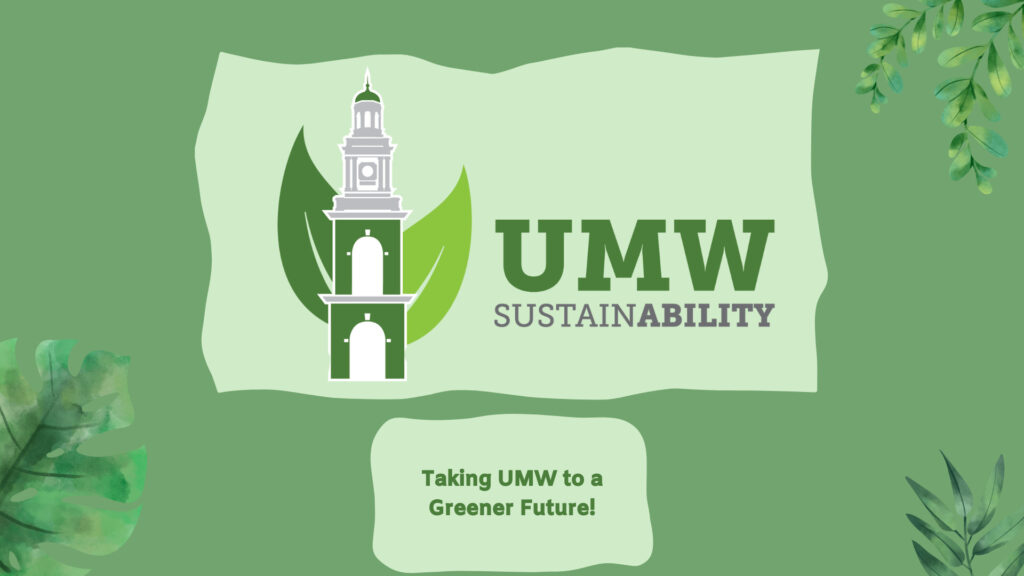President’s Council on Sustainability aims to make UMW more eco-friendly
3 min read
University of Mary Washington Office of Sustainability clipart. | photo courtesy of sustainability.umw.edu
by IBERT FANCHER
Staff Writer
The President’s Council on Sustainability held its first meeting of the semester on Jan. 17. The council was created in the fall of 2009 with the goal of making the campus more sustainable in terms of being able to coexist with the environment in the coming years.
The council’s goal “is to play a critical role in shaping administrative goals, objectives related to sustainability,” said Sean Morrow, university sustainability coordinator. “The committee regularly meets to discuss recommendations and opportunities for action on campus sustainability issues, policies, or strategies.”
As listed on the council’s website, current goals include researching renewable energy options for campus, examining the feasibility of operating UMW events at the certified green event level and looking into logistics of composting food waste from the dining hall.
“The University has done a lot to conserve resources especially in the UC,” said Curtis Kasiski, a class of 2022 UMW graduate who served as a council member. “One of the more notable improvements was the addition of a trash grinder, meaning they can use half as many plastic bags. A community garden was also established with the work of Dr. Bonds last summer which is something they have been trying to achieve for a long time.” Eric Bonds is an associate professor of sociology and anthropology at UMW.
University President Troy Paino is in charge of appointing the council members, a mixture of staff, faculty and students that are selected from a list of applicants. The council is currently focusing on action goals in four categories—administration and finance, operation, education and outreach, and innovation and awareness—all of which are aiming to make UMW more sustainable.
Senior Earth and environmental science major Ava Spencer served as a co-chair of the council last year.
“Getting to be a co-chair of the President’s council gave me wonderful experience of what my major could turn into the real world pursuing a job,” she said. “They took students seriously, listened to our concerns, and actively tried to make change happen. It felt like important work.”
The council was formed in 2009 and started the process to fund and hire a full-time sustainability position at UMW. After the position was created, it led to the formation of The Office of Sustainability.
“At its roots, and especially shown on campus, sustainability is a very interdisciplinary conversation – meaning there are so many facets of UMW’s community, operations, vision & goals, facilities and more that can be connected in one-way shape or form to ‘sustainability,’” said Morrow. “UMW has made measurable progress in designing future goals, projects, etc. with Sustainability in mind. ”
According to Morrow, the Council led the draft of UMW’s first Climate Action Plan and the Climate Action Task Force.
“The current university’s level of sustainability is moderate, with room for improvement,” said senior conservation biology major, Mackenzie Dickson. “More trash and recycling bins should be provided throughout campus with pictures and an explanation of what can go where; the campus is known for throwing away things in the recycling bin. ”
Paino often attends the council’s meetings.
“President Paino has been very involved and has attended past meetings with the intention of figuring out what we need,” said Kasiski.
The committee reports to the Executive Vice President for Administration and Finance and the University Provost.
“Over the years, Dr. Paino and members of his cabinet have attended PCS meetings from time to time and have met with the co-chairs of the PCS to discuss specific sustainability actions and goals for UMW,” said Morrow. “From the perspective of the PCS, we’ve had a very positive relationship with President Paino since he’s been at UMW.”
Morrow is optimistic about the impact of the council on UMW’s sustainability efforts.
“In comparison to other public universities, we can recognize UMW has room to improve, but with the direction of the PCS and the many sustainable minds on campus, there is a wealth of optimism for the direction of UMW sustainability,” he said.


